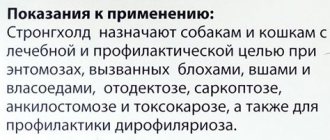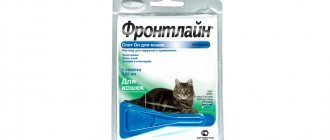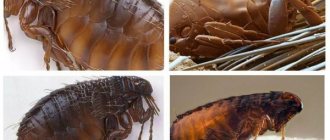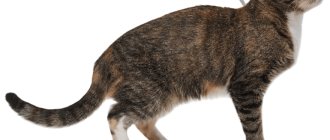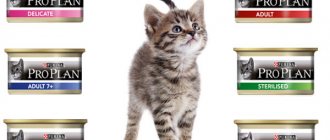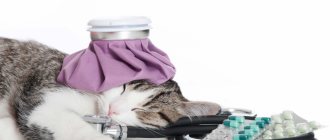Every cat owner must provide their pet with proper care. It is impossible to completely protect an animal from parasites 100%. The owner’s task in this case is to carry out regular prevention, promptly treating the cat against parasites.
You should adhere to the schemes created by veterinary specialists. In the absence of antiparasitic treatments, a cat, even one that does not have free access to the outdoors, can suffer from ecto and endoparasites.
What types of parasites do cats have?
There are two main types of parasites dangerous to cats:
— external (fleas, ticks, lice, lice);
- internal (worms - tapeworms and roundworms).
Infection with each of these types of parasites has its own symptoms and treatment methods. And each of these parasites poses a danger, for example, if worms are not removed, then in the end this can even lead to death.
Read more about internal parasites: Worms in cats: symptoms and treatment
Symptoms of fleas and worms in kittens
Many owners believe that if bloodsuckers are not visible, then they are not there. This is a misconception. Fleas live in the environment; they only come to the animal’s body to feed.
You can suspect an invasion based on a number of indirect signs:
- comb;
- itching (the kitten is constantly itching, trying to rub against furniture);
- restless behavior.
Dark small crumbs are noticeable on the pet’s body - this is not dirt, but waste products of insects. If you comb out the grains onto a white sheet and moisten them with water, they will blur into brownish-red spots.
If the bloodsuckers are not removed, they will continue to reproduce. A large number of bites will lead to the development of anemia in the kitten. Due to continuous itching, the cub stops eating and sleeping normally and quickly loses weight.
In addition, fleas act as carriers of life-threatening infections, worms. Helminthiases in the early stages are asymptomatic. As the worms affect the internal organs, negative signs appear.
Depending on the type of parasite, the kitten may experience:
- diarrhea alternating with constipation;
- yellowness or paleness of the mucous membranes;
- bloating due to general exhaustion;
- excessive appetite (in later stages, refusal to eat is possible);
- deterioration in quality, hair loss;
- vomit;
- paroxysmal cough;
- rash;
- copious serous or purulent discharge from the eyes and nose;
- impurities of blood, mucus in the stool, and the release of helminths with feces or vomit.
Wormed kittens lag behind in growth and development compared to their peers. Worms can cause intestinal blockage and paralysis of the hind legs. If the baby is not treated, the consequences of helminthiasis will be irreversible. You need to get rid of them at the first sign of infestation.
Yuri Lizvinsky Veterinarian, head of the training department of Apicenna LLC
Routes of infection
External parasites in cats are also called ectoparasites. They live on the skin and fur of purrs. With their bites they cause anxiety, itching, dermatitis, and allergic reactions in the pet.
The main way a cat is infected with external parasites is through contact with an already infected animal. As a rule, this happens on the street while walking on your own. A cat can also pick up parasites from a dog living in the same house as dogs walk outside. The owner himself can bring parasites into the apartment on shoes or clothes. If after this he immediately (without washing his hands) strokes the cat or if it lies on the rug near the front door, then parasites may well get on it.
Finally, some parasites (for example, fleas) can enter your home themselves, even if you do not live on the first floor. With its ability to move, the flea will calmly jump to your apartment and enter the opening door with you (of course, this is much less likely than an infection on the street). Once in the apartment, the insect will multiply quickly. He doesn't have to do the masonry. Even while jumping, it can scatter eggs, shooting anywhere. Over time, the flea will settle on the cat.
A small kitten can be infected by a mother cat, and fleas live on kittens with great pleasure.
How to treat bedding, carpets, furniture?
It is convenient to use sprays and aerosols to treat the room. Use a spray bottle to spray the cat's bed, corners of the room and all places where the cat could leave fleas. Bedding and clothes are thoroughly washed at the highest temperatures; if the fabric allows, they are boiled.
In a cat's house or box, you can put a sachet with aromatic herbs that repel insects: wormwood, geranium, lavender. If the cat was bathed in a decoction of wormwood or hellebore water, then you can wash the floors and walls with these liquids, and wash home rugs in them. Essential oils of geranium, eucalyptus, cedar, and lemon repel ectoparasites. You can spray the corners of rooms and furniture with them.
Signs of External Parasites
The main sign of the presence of ectoparasites in a cat is severe itching, which becomes more pronounced every day. Because of this itching, the pet will vigorously scratch the bite area and try to comb insects out of its fur with its claws. The cat will also try to bite and gnaw at parasites and actively lick the fur.
Due to constant torment and discomfort, the cat becomes lethargic, irritable, stops listening to the owner, practically does not sleep at night, and refuses to play.
Alopecia, scratching, scratches, and redness appear on the fur and skin. In some cases, signs of allergic reactions may appear: the eyes become watery, the skin becomes covered with a rash and pustules.
Article information
This article was co-authored by. Dr. Elliott, BVMS, MRCVS is a veterinarian with over 30 years of experience in veterinary surgery and the care of companion animals. She graduated from the University of Glasgow in 1987 with a degree in Veterinary Medicine and Surgery. He has been working at the same animal clinic in his hometown for over 20 years.
Category: Cat Health
In other languages:
English: Kill Fleas and Ticks on Cats, Español: matar las pulgas y las garrapatas en los gatos, Português: Matar Pulgas e Carrapatos em Gatos, Deutsch: Flöhe und Zecken auf Katzen töten, Italiano: Uccidere Pulci e Zecche sui Gatti, Français: débarrasser son chat des puces et tiques, Nederlands: Je kat ontdoen van vlooien en teken, 中文: 去除猫身上的跳蚤和蜱虫, Bahasa Indonesia: Menghilangkan Kutu pada Kucing, Čeština: Jak zabít blechy a klíš ťata u koček, Tiếng Việt: Diệt bọ chét và ve bét ở mèo, 한국어: 고양이 몸의 벼룩과 진드기 제거하는 방법
This page has been viewed 18,784 times.
Was this article helpful?
Not really
Treatment for parasites
Read about how to treat a cat for internal parasites here: Preparations for deworming cats
In this article we will focus on what to do if your pet has external parasites (fleas, lice, lice). Please note that a veterinarian must make an accurate diagnosis and prescribe a course of treatment, even if it seems to you that the presence of certain parasites is obvious. You can even correctly identify their type, but the effectiveness of treatment depends on other factors: the age of the animal, its characteristics, the presence or absence of other diseases.
After prescribing therapy, the main condition that is important to observe is to use the chosen remedy strictly according to the instructions. This will effectively remove parasites without harming the cat.
Medicinal shampoos. As a rule, these funds are used first. They have an insecticidal effect, inhibiting the activity of insects. After applying shampoo to your pet’s fur and foaming, you should definitely wait a few minutes, usually 5 to 10 (it’s better to time the time by clock), and only then rinse off the shampoo. It should be borne in mind that different shampoos have different effects: some eliminate existing parasites, and some only repel insects (that is, they are used as a preventive measure).
Sprays. They also contain insecticides that effectively fight the disease. The spray can be used to treat not only the cat itself, but also its things (toys, beds, etc.). But be sure to make sure that she does not lick the preparation from the fur (until it dries completely)!
Drops on the withers. Can be used both for direct treatment and for preventive purposes. There is no need to be afraid that the cat will lick the drug. The effect of the drops lasts about 1-2 months when applied correctly: on dry, clean skin in the area between the shoulder blades or on the withers. Manufacturers recommend not bathing your cat a few days before applying the drug and a few days after.
Collars. This is the most durable and safest way to rid a kitten of parasites. It acts as gently as drops and shampoos. When choosing, pay special attention to the size and stiffness of the collar so that your pet feels comfortable in it.
Methods of disposal
Flea treatments may come in the form of aerosols.
To combat any insects, including cat ticks and fleas, special preparations have been created that are used in the form of:
- dust based on karbofos, chlorophos, pyrethrum, etc.;
- shampoo - the active ingredient in its composition is permethrin;
- aerosol;
- tablets;
- injections;
- concentrated emulsions - usually Stop On drops, that is, for direct application to the skin;
- collars soaked in an insecticidal solution.
Each of these products is based on chemical compounds divided into 4 large groups:
- organophosphorus,
- organochlorine,
- carbamate,
- inorganic origin.
There is also a division according to the type of effect on insects:
- killing mature fleas;
- destroying larvae;
- detrimental to adult eggs.
Let's try to understand all this variety of insecticidal preparations.
How to protect a cat from parasites
It is best not to remove parasites (external and internal), but to prevent their appearance at all. To do this, follow simple rules:
- Do not let your cat out of the house; on the street, in addition to parasites, other dangers await her.
Read more: Self-walking - when freedom means death
- The tray must be cleaned of dirt every day - feces should not remain there for more than a day.
- When completely changing the filler, the tray is thoroughly washed with hot water and soap (laundry soap works well).
- The cat must be provided with a high-quality and balanced diet. Professional super-premium and holistic-class foods are best suited, as they already contain all the necessary vitamins and minerals. The pets at the Murkosha shelter receive exactly this kind of food.
- Do not give your cat raw meat and fish - neither freezing nor scalding with boiling water guarantees the safety of the food.
Read more: Proper nutrition for cats
- Try to wean your cat from sitting on the rug by the front door.
- If possible, put your shoes in a closet or on a rack.
- Do wet cleaning regularly.
In addition, you still need to regularly treat your cat against external and internal parasites for preventive purposes.
Prevention
Preventing a disease is easier than treating it. If you avoid infection, you do not need to choose drugs to treat your cat.
Preventive anti-flea measures include:
- Preventing contact between indoor cats and outdoor cats.
- Wet cleaning of the apartment with the addition of insecticides to the water - at least once a month.
- Steam treatment of cat accessories: bedding, sleeping baskets, litter tray.
It is also important to wash your hands when you come home from the street, and keep your clothes and shoes clean. The rules are simple, but following them helps to avoid problems associated with a cat becoming infected with blood-sucking insects.
Detergents
Regular soaps or shampoos will not work for humans. The kitten needs special products for bathing, and in case of flea infestation - containing active substances of a medical nature. In pet stores and veterinary pharmacies you can always find solutions depending on your situation and your budget.
Popular flea shampoos for kittens:
- Kiss;
- AVZ Elite Organic;
- Api-San;
- Beaphar;
- Lugovoy;
- Leopard.
Precautionary measures
In addition to personal protective equipment for your cat, you should consider the condition of your property. How to protect a cat? Try to cut or mow the grass as often as possible, do not leave excess debris from the same grass or branches on the site, and remove dried branches. The neater your area will be, the less tall grass there is, the less likely it is to be attacked by ticks.
Always check your cat when she returns from a walk.
Even high-quality protective equipment can fail, so it is very important to monitor your pet’s condition yourself. If you notice a tick, you should immediately remove it using tweezers or a special device.
Try to wash your cat's bedding as often as possible, this will help maintain an adequate level of hygiene and safety for your pet.
Now you know how to protect your cat from ticks in the country. A variety of methods and means of protection provide great opportunities for keeping your cat safe, even in the midst of parasite activity.
Anti-flea shampoos
They are used as an emergency treatment for cats with a severe degree of infection, as well as for animals suffering from hypersensitivity to chemicals, and kittens of one month of age.
Shampoos are produced by the already well-known companies Bars and Celandine; in addition, we can also note the imported products Rolf Club and Mr. Kiss.
In fact, there are too many products to try to list; it is important to understand that almost every product is based on permethrin. The obvious advantage of using shampoo is the ability to not only get rid of parasites, but also take care of your cat’s fur.
The obvious advantage of using shampoo is the ability to not only get rid of parasites, but also take care of your cat’s fur.
The advisability of bathing
First of all, this is an opportunity to get rid of insects that parasitize a small pet. The active substances that make up industrial sprays, tablets and gels are quite aggressive. The baby’s immunity is just beginning to develop and any poisoning caused by toxic drugs can be fatal.
Bathing a kitten with flea shampoo is the only panacea for blood-sucking parasites. Therapeutic water procedures are especially important for purebred cats, for example, Scottish or British, because they have a very difficult time being around these insects.
For reference! Some cat breeds love to swim and enjoy spending time in the water. Among them are Maine Coons, Bobtails, Egyptian Mau and Bengal cats.
Contraindications
Despite the apparent safety of this enterprise, it has a number of contraindications. The critical point is age. Under no circumstances should kittens under 3 months of age be allowed to participate in water procedures. During the washing process, skin lubricant dissolves, which opens up wide possibilities for dermatitis and other skin problems.
Swimming restrictions:
- Disease . If the kitten is sick (problems with the gastrointestinal tract, helminths, lichen, infections, etc.), then before bathing you should consult a specialist.
- Vaccination . Your pet should not come into contact with water for two weeks after any vaccinations.
- Surgical intervention . If there are fresh stitches on the body, then water procedures are strictly prohibited.
- Stress . When a cat is psychologically unstable, it cannot be treated with detergents and water. This will only aggravate stress and discourage your pet from water procedures.
